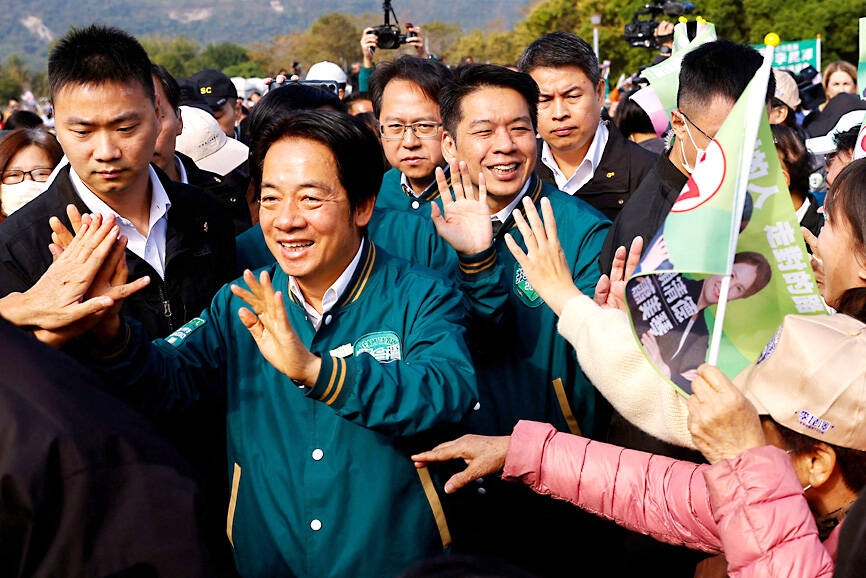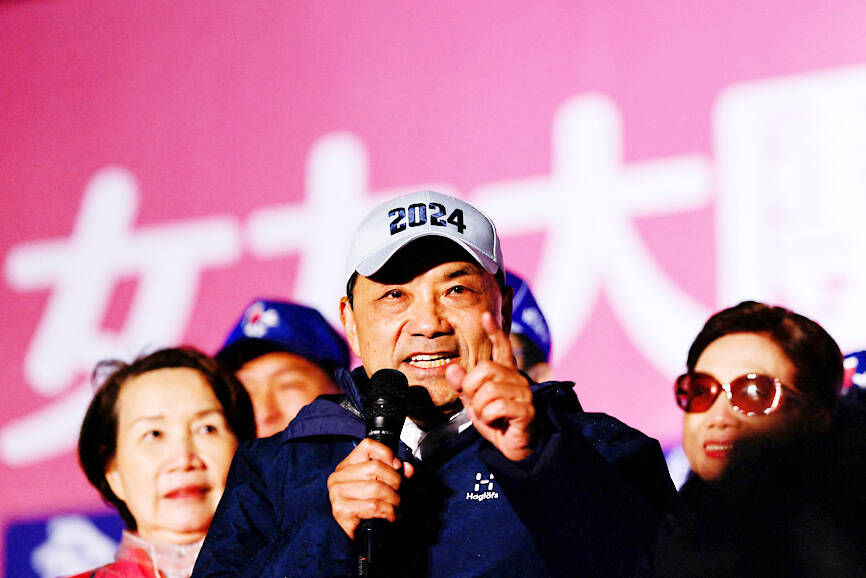As the Jan. 13 presidential and legislative elections approach, Taiwan’s fraught relationship with China is not the only issue competing for voters’ attention.
Candidates are exchanging blows over everything from property disputes to whether drinking whisky is out of touch, in a raucous and freewheeling display of the nation’s democracy.
The elections are expected to define how Taipei deals with Beijing, and the subject is indeed a major bone of contention.

Photo: Ann Wang, Reuters
However, it is far from the sole issue debated at rallies, news conferences and on television talk shows, where the uncensored exchanges are a major contrast to China, which has been ruled only by the Chinese Communist Party since 1949.
One subject taking much of the limelight is whether the childhood home of Democratic Progressive Party (DPP) presidential candidate Vice President William Lai (賴清德) was illegally expanded by his family in an old coal mining area north of Taipei.
Lai has denied anything untoward took place, but he has pledged to donate the tidy-looking house — which the opposition have dubbed Lai’s “rascally shack” using Chinese wordplay on his name — so that it can be turned into a miners’ museum.

Photo: Ann Wang, Reuters
“I have seen that villagers in mining areas are worried the houses they have settled down in would be considered illegally built and be demolished. I am very sorry about this. It is my responsibility to help everyone find a way to protect their housing rights,” Lai said last week.
The property ownership of Chinese Nationalist Party (KMT) presidential candidate New Taipei City Mayor Hou You-yi (侯友宜) and Taiwan People’s Party (TPP) Chairman and presidential candidate Ko Wen-je have also garnered attention.
The DPP has criticized Ko for co-owning farmland illegally turned into a parking lot, and Hou of profiting from renting out a large number of apartments his wife owns.
Ko has promised to tear up the parking lot. Hou has denied wrongdoing, and his wife yesterday said the apartments “from beginning to end do not belong” to him, denouncing “political smears and suspicion.”
Lai has a lead of about 5 percentage points in most polls, although some have shown Hou only one or two points behind.
One focus for all parties has been how to appeal to the young, with an estimated 1 million new voters eligible to vote in these elections.
Ko has honed in on bread-and-butter issues such as the high cost of housing, and young people have flocked to his rallies even if he has trailed in the polls.
However, the TPP has been accused of being out of touch with ordinary people because of Ko’s choice of running mate, Legislator Cynthia Wu (吳欣盈), whose family are major shareholders in Shin Kong Group.
The TPP’s opponents mocked Wu for comments at a vice presidential debate on Friday last week, when she said “when I was young, everyone loved to drink Johnnie Walker,” referring to the popular whisky.
Democratic Progressive Party Legislator Wang Ting-yu (王定宇) shot back, writing on Facebook that when he was young, “we mostly drank plain water.”
Wu downplayed the furor.
“Sarsaparilla, beer, guava juice and Johnnie Walker is for us Taiwanese what should be on the table to drink. OK? So there’s no need to make a fuss about it,” she said.

A preclearance service to facilitate entry for people traveling to select airports in Japan would be available from Thursday next week to Feb. 25 at Taiwan Taoyuan International Airport, Taoyuan International Airport Corp (TIAC) said on Tuesday. The service was first made available to Taiwanese travelers throughout the winter vacation of 2024 and during the Lunar New Year holiday. In addition to flights to the Japanese cities of Hakodate, Asahikawa, Akita, Sendai, Niigata, Okayama, Takamatsu, Kumamoto and Kagoshima, the service would be available to travelers to Kobe and Oita. The service can be accessed by passengers of 15 flight routes operated by

Chinese spouse and influencer Guan Guan’s (關關) residency permit has been revoked for repeatedly posting pro-China videos that threaten national security, the National Immigration Agency confirmed today. Guan Guan has said many controversial statements in her videos posted to Douyin (抖音), including “the red flag will soon be painted all over Taiwan” and “Taiwan is an inseparable part of China,” and expressing hope for expedited reunification. The agency last year received multiple reports alleging that Guan Guan had advocated for armed reunification. After verifying the reports, the agency last month issued a notice requiring her to appear and explain her actions. Guan

GIVE AND TAKE: Blood demand continues to rise each year, while fewer young donors are available due to the nation’s falling birthrate, a doctor said Blood donors can redeem points earned from donations to obtain limited edition Formosan black bear travel mugs, the Kaohsiung Blood Center said yesterday, as it announced a goal of stocking 20,000 units of blood prior to the Lunar New Year. The last month of the lunar year is National Blood Donation Month, when local centers seek to stockpile blood for use during the Lunar New Year holiday. The blood demand in southern Taiwan — including Tainan and Kaohsiung, as well as Chiayi, Pingtung, Penghu and Taitung counties — is about 2,000 units per day, the center said. The donation campaign aims to boost

The Central Weather Administration (CWA) said a magnitude 4.9 earthquake that struck off the coast of eastern Taiwan yesterday was an independent event and part of a stress-adjustment process. The earthquake occurred at 4:47pm, with its epicenter at sea about 45.4km south of Yilan County Hall at a depth of 5.9km, the CWA said. The quake's intensity, which gauges the actual effects of a temblor, was highest in several townships in Yilan and neighboring Hualien County, where it measured 4 on Taiwan's seven-tier intensity scale, the CWA said. Lin Po-yu (林柏佑), a division chief at the CWA's Seismological Center, told a news conference